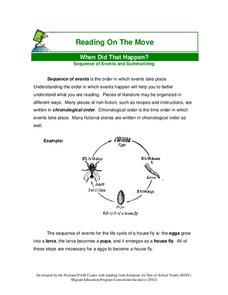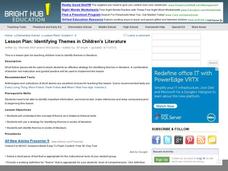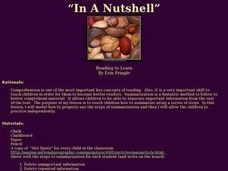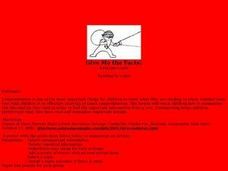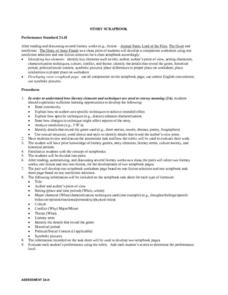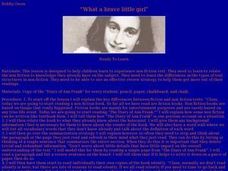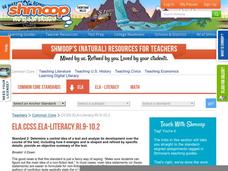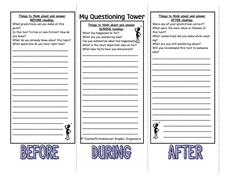New York City Department of Education
What Did I Do to Be so Black and Blue: How Did Jazz Influence Ralph Ellison's Invisible Man
How did jazz influence Ralph Ellison's Invisible Man? Class members read some of Ellison's non-fiction writings about blues and jazz, listen to records, watch videos, and engage in student-centered discussions. They then produce podcasts...
Curated OER
Stranger Than Fiction
Learners reflect on the importance of science literacy. They review the year's science curriculum by reading, discussing and writing questions on teacher-selected New York Times articles and the related science content.
Curated OER
Mayan Myths/Folktales
Middle schoolers work on summarizing a story, and they determine if it is a legend, a myth, or a fable. Working in groups to read and summarize stories, they then list evidence whether the tale is a myth, fable, or legend. They present...
Curated OER
Kumeyaay Indians
Useful for literary analysis, citing textual evidence, or summary skills, this lesson about the Kumeyaay Indians would be a good addition to your language arts class. Middle schoolers read novels and summarize the literature in their own...
Curated OER
When Did That Happen?
An awesome packet teaches individuals how to chronologically order and sequence events. The resource also provides practice that immediately follows the different ways to order events. Lastly, learners read a newspaper article...
Curated OER
Identifying Themes in Children's Literature
Identifying themes in literature is the focus of the language arts lesson plan presented here. Learners read short pieces of fiction and practice the skill of identifying the themes present in each one. The bulk of the lesson consists of...
Curated OER
My Secret War: Lesson 4
Fifth graders write a speech. In this history lesson, 5th graders define the word infamy and listen to a speech by FDR. Students work in groups to summarize his speech and rewrite sections of the speech.
Polk Bros Foundation
Common Core Constructed Response Organizer
Get your writers ready to compose a constructed response essay in response to either an informational or fictional text. Pupils note down the big idea they wish to address as well as up to nine examples from the text that they wish to...
Curated OER
In a Nutshell
Students summarize a non-fiction article in this instructional activity. They review a six step process for summarization. They then read the assigned article, and work as a class to write a summary using the five steps provided. They...
Curated OER
Give Me the Facts!
Young scholars study how to summarize a reading passage to improve their comprehension. They read a non-fiction passage and use five steps to summarize it while working in groups of three. Next, as class, they decide which group provided...
Curated OER
Story Scrapbook
Students develop a comparison worksheet using one non fiction book and one fiction book they have read to be put into a class scrapbook. In their comparison students must have title, author, point of view, setting, characters, and other...
Curated OER
Columbus in a Summary
Learners summarize a non-fiction selection in this lesson. Students review the rules of summarization: delete trivial information, delete repeated information, superordinate items and events, and find or compose statements that covers...
Pennsylvania Department of Education
Stories? Information? What's the Difference?
Young scholars listen to a power point presentation to distinguish between fiction and nonfiction text. In this what's the difference activity, students identify fact from opinion within a text. Young scholars listen critically and...
Curated OER
What a Brave Little Girl
Learners practice relating non-fiction to knowledge they already have on the subject. They evaluate differences in the types of text structrures in non-fiction. They employ a review strategy that allows them to understand their reading.
Curated OER
Researching Using Books
Students investigate researching techniques by exploring their library. For this literature references lesson, students identify the different types and genres of books that are readily available at their local library as well as proper...
Curated OER
Putting it all Together
Students take notes and summarize information. In this communication lesson, students summarize information by taking notes using the various methods that their instructor presents to them.
Curated OER
Note-Taking
Students take notes and summarize information. In this communication instructional activity, students summarize information by taking notes using the various methods that their instructor presents to them.
Curated OER
Putting It All Together With Summarization
Students use a checklist to write a summary of a non-fiction article. The checklist includes: redundant information taken out, trivial information taken out, and only main points included in the summary. Using this checklist, they ...
Curated OER
Nazis Flying Saucers – Film Sparks UFO Debate
Young scholars explore the aircraft used in World War II. In this World History lesson, students read an article that describes a "flying saucer" created by the Nazi's. Upon completion of the reading, young scholars answer questions on...
Curated OER
Essential Meaning in Text Using Non-fiction Information Source
Young scholars practice the skill of summarizing in writing the content of a passage or text and point out the main points in the story. They revise their skills on note-taking that they took the semester before and fine tune them more...
Curated OER
Researching the Past
Learners research the western movement in order to learn note taking strategies with nonfiction texts. They use the Internet to search for important information about the western movement using the Cornell Notes note-taking system. They...
Teaching Tolerance
Media Consumers and Creators, What Are Your Rights and Responsibilities?
Teach the class to separate fact from fiction. Scholars explore the topic of fake news as they read PEN America's News Consumers' Bill of Rights and discuss the rights and responsibilities outlined in the bill. Next, they read an article...
Schmoop
ELA.CCSS.ELA-Literacy.RI.9-10.2
Although the ideas on how to implement the skill RI.9-10.2 are lacking, the assessment would work well for challenging learners to summarize, and identify the main ideas of presidential speeches that are of similar topics. One could use...
Teacher Printables
My Questioning Tower
Good readers think about what they are reading. They ask questions and make predictions before beginning a text. While reading, they summarize what has happened and note what they have discovered. After finishing, they check to see if...






